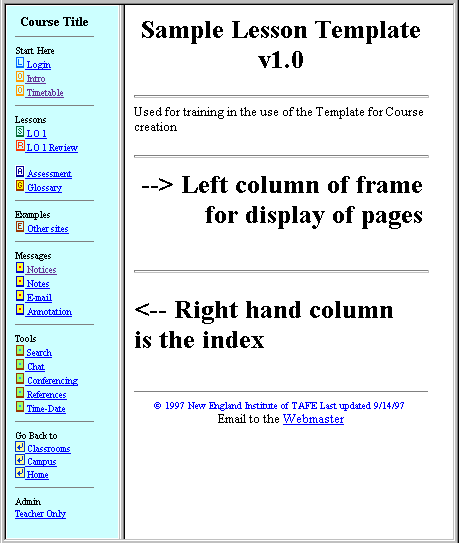Developing on-line courses — teacher support needs
Chuck Shave
New England Institute of TAFE,
Tamworth, NSW 2340, Australia
Chuck.Shave@tafensw.edu.au
- Abstract
-
This project focuses upon the needs of teachers for training
and support for the development of Web-based courses. Using six Web-based
courses as the focus of the project, the development of the courses is
documented from a teacher/developer's point of view. The outcomes of the
project will assist in the planning and development of future Web-based
courses by the Institute.
- Keywords
-
Education; Training; Teachers; Support
1. Introduction
As an educational provider and developer, TAFE has a large volume of educational
materials produced for both classroom and distance education. With growing
interest of offering courses on the Internet, questions of support and
skilling of teachers are raised.
2. Questions the project will focus on
How much time, upskilling and support, is required to assist staff to
prepare material for Internet delivery?

3. Background
Research in the area of on-line courses has focused on the student, there has been little or no work focusing
on the training and support teachers require to prepare and deliver these
courses [1]. The present project will focus on what the teachers
require in terms of support, training and costs to prepare and deliver
courses on-line.
To assist teachers/developers prepare material for Internet delivery, a template for
the Net-Classroom has been developed. The template, while not prescriptive,
contains many of the elements that the literature [2] suggests assist in making
a Net-Classroom successful. The template makes use of a frame divided into
two columns.
-
The left hand column is the navigation or index frame.
-
Right column is used to display the page content.
The Admin option provides tools for the developers and teachers. Some
of the tools include: on-line student record/mark book; course notice
publisher; annotation publisher; and on-line test maker. Additional tools
are being developed or purchased as the need for them are identified.
4. Development teams
The courses are developed using a team of people. Each team includes skills
of a subject specialist, a distance education specialist, publishers, and
graphic designers. In most cases this means that several people will be
involved in each project. The skill level of each team will be documented
at the beginning and then at the completion of the project to determine
what training is required for future course development.
5. Courses that will be used in this project
The following courses form the source material for research: Fine Art,
Communication, OH&S, Sheep and Wool, Network Support, and Tertiary
Preparation Course.
6. Evaluation
-
Staff will keep a log of time and activities involved in the modification
of material to produce the Internet courses. The results will be analyzed
to assist in preparing future support for these activities.
-
Assess what training/assistance staff will need to prepare appropriate
material.
-
Staff satisfaction surveys will assist in future planning of staff support
requirements.
-
Discussions based on logs and staff impressions will help identify the
training needs for staff involved in Internet preparation of courses.
7. Reports
8. What we are doing to support and skill teachers
-
To get teachers started, we have implemented a series of workshops. The
first meeting is to (a) get a feel for what the teachers are wanting to
do (b) give the teachers a feel for what are some of the added value features
(c) explore ways that traditional activities such as workshops can be run
on the Internet and (d) develop an overall plan and timetable for the near
future and for the whole of the project.
-
Between the 1st and 2nd meeting the technical staff develops one lesson
and fills in some of the basic details of the template. This allows the
whole team to get underway quickly and encourages the teachers as they
see a quick result from their efforts. Workshop 2 is usually organized
for some time within the next week. At this workshop we review what has
been developed and start to show teachers how they can make use of some
of the on-line utilities available to them in continuing to work on their
course (3 to 4 hours).
-
The direction of future support varies at this point dependent upon individual
circumstances. Many of these are common needs and workshops or other strategies are being developed to address these issues.
References
[1] Merkley, D., Investigating Support for teachers using distance learning in education: a case
study, http://www.hibo.no/trond/deosweb/vol7/nr11.html
[2] Goldberg, M., Using a Web-based course authoring tool to develop sophisticated Web-based
courses,
http://homebrew.cs.ubc.ca/webct/papers/book/index.html
URLs
The New England Institute of TAFE
Home page
The
New England Institute of TAFE Internet Campus Page
